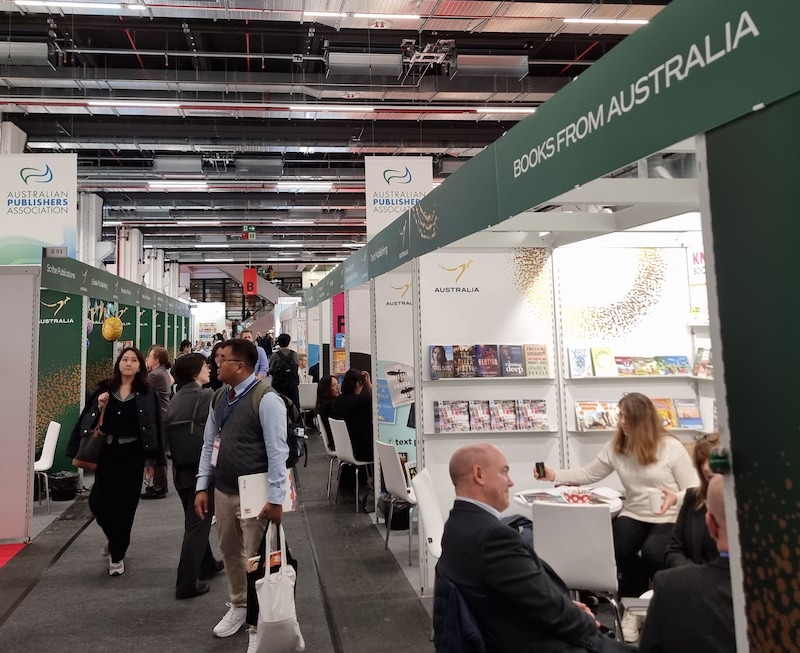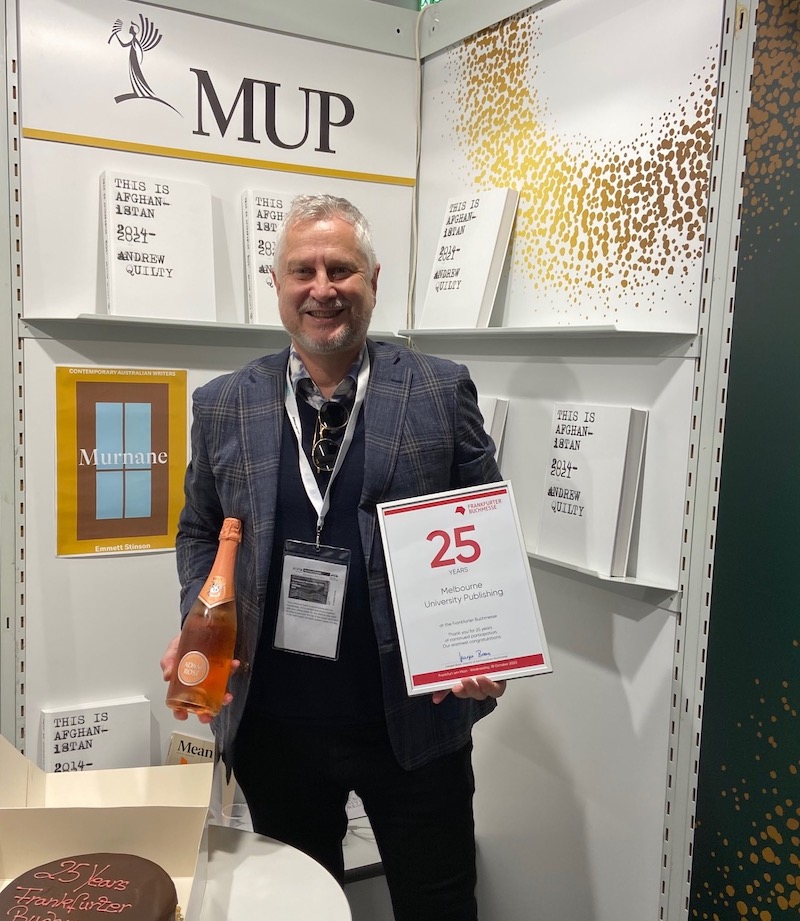
25/10/2023
The Australian stand at Frankfurt was busy last week, with the fair recording a 20% increase in trade visitors, and Australian publishers reporting productive meetings.
As the first truly post-pandemic Fair, the 75th Frankfurt Book Fair attracted around 105,000 trade visitors from 130 countries – an increase of almost 20% compared to last year.
Books From Australia at Frankfurt
In its new home on the ground floor of Hall 6, this year’s Australian Collective Stand hosted 16 Australian publishers, with a further 10 publishers participating in the Books From Australia Virtual Stand.
APA Industry Development Manager Andrea Hanke said of this year’s Fair:
‘It was wonderful to see so many Australian publishers and agents back at Frankfurt. The halls were busy, publishers were upbeat about their meetings, and we were very happy with the Australian Collective Stand’s new home in Hall 6.0.’
Stand participants also noted that the new position was very convenient, close to the agents in the new Rights Centre, and more discoverable with useful foot traffic.
Some publishers used the fair to reconnect with existing contacts, while others took the opportunity to build relationships in new markets. And while there appeared to be no standout trends, interest in First Nations titles continues, with Giramondo’s Nick Tapper – who participated in the Fair’s Fellowship program – reporting interest from European publishers in Alexis Wright’s new novel Praiseworthy and backlist titles.
 Malcolm Neil of Melbourne University Press, recognised for 25 years participating at the Fair
Malcolm Neil of Melbourne University Press, recognised for 25 years participating at the Fair
MUP celebrates 25 years at the fair
There were celebrations for Melbourne University Publishing this year, with the Fair honouring the publisher’s 25 years of participation with a delivery of a certificate, champagne and cake.
AI, copyright, sustainability and reading engagement dominate Frankfurt discussions
Discussions of the International Publishers Association (IPA), and the Fair’s professional development program, both focussed heavily on AI and sustainability. The IPA released a White Paper on the agreed international methodology for calculating the carbon output of books, while testing for a carbon-label prototype continues. You can find a useful round-up of some of the AI and sustainability sessions from Publishers Weekly here.
Global reading engagement
Slovenia took the opportunity as Frankfurt’s Guest of Honour to launch the Ljubljana Reading Manifesto, with reading positioned as essential to critical thinking and fostering democracy.
Signatories include the IPA, the Federation of European Publishers, IFLA and IBBY. Interest was expressed by German colleagues in supporting the manifesto at a European Union level, with the Dutch and Finns highlighted as case studies in successfully promoting a national culture of reading.
AI, copyright and sustainability focus for the IPA
It seems one of the permanent changes from Covid is that the IPA’s AGM, which they call the General Assembly, is conducted online and not held at the Frankfurt Fair.
A benefit of this is that it gives more space to discuss key issues. Sustainability is now a headline concern among IPA members, along with the perennial defence of copyright. As well as the release of the Carbon white paper, the Educational Publishers Forum too was focused on the educational sector’s potential for improving understanding about global environmental challenges.
The annual global round-up at the IPA’s Copyright meeting can be dispiriting. Around the world, the appetite to use created works without payment or permission seems unquenchable. AI dominated this year’s discussions. The word ‘corpus’ may never have been previously mentioned åat this meeting. This year it was everywhere, including in reports from several countries that national collecting institutions had proposed or started to use the digital archive they have acquired for preservation under statutory deposit laws to create a text corpus data set for training AI.
There was also talk about the definitional challenge of AI. Does a sweeping commitment to be AI-free, mean a publisher can’t publish work on which an author has used spellcheck? Or Grammarly? Some publishers reported extensive reviews and redrafting of contracts to make sure they’re not allowing unintended use.
These issues also appeared in the Bookseller and Publishers Weekly daily editions, alongside the impact of geopolitics at the Fair. The Bookseller’s front page story on Thursday was of Nihar Malaviya – PRH’s new global CEO – saying that ‘the key questions facing the publishing industry are: “can copyrighted content be ingested into LLMs [large language models] without permission of the copyright owner, and can content coming out of LLMs be copyrighted?”’
The Bookseller’s cover story on the first day of the Fair was an issue mentioned by several translators who visited the Australian stand. Its opening paragraph was direct: ‘The success of Britain’s English-language export sales into some European markets is cannibalising local book sales, gutting translation revenue, harming Anglophone author earnings and has “an unpleasantly colonial feel”.’
Publishers Weekly put Salman Rushdie on the cover of its Friday edition. He was given the Peace Prize of the German Book Trade ‘for his indomitable spirit, for his affirmation of life, and for enriching our world with his love of storytelling.’
The APA’s export projects and attendance at Frankfurt Book Fair are assisted by the Australian Government through Creative Australia, its principal arts investment and advisory body.